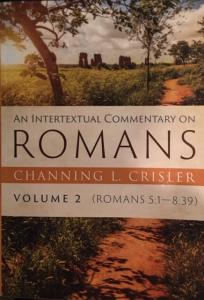Paul speaks in almost a schizophrenic way in Romans 7:7–25. This text is called the divided “I” since our apostle repeatedly uses the first-person singular as though being double-minded. He laments over his predicament as a “wretched man” who desperately needs deliverance.
Romans 7:14–15 capture the sentiment well: “For we know that the law is spiritual, but I am fleshly, sold under sin. For I do not understand what I am accomplishing. For what I want, this I do not practice, but what I hate, this I do!”
Is Paul speaking of himself or representing someone else in this text? How should we interpret this passage intertextually?

For our study we will once again draw on the study of Dr. Channing L. Crisler, Associate Professor of New Testament at Anderson University, who has recently written a multi-volume set entitled, An Intertextual Commentary on Romans (Pickwick Books). We are currently studying his second volume, Romans 5:1–8:39. In our previous installment with Dr. Crisler, he gave some of his insights from Romans 5. We will cover more generally other topics in Romans 6–8 for our next study, but this one focuses on Romans 7.
Dr. Crisler employs Psalms of lament to Paul’s divide “I,” and the results are insightful.
Psalms of Lament in Romans 7
Oropeza: Scholars have proposed a number of different pre-texts to Paul’s divided “I”—the person who speaks in the first-person singular and wants to do what’s right but does what’s wrong (Rom 7:7–25). What is your interpretation of this passage?
Crisler: I wrote about this passage extensively in both a monograph and article prior to the publication of this commentary. My reading suggests that Paul engages with multiple Old Testament (henceforth, OT) pre-texts in this passage, most notably Genesis 2–3 and various Psalms of Lament (esp. Psalm 37 LXX [Psalm 38 in most English Bible Translations; henceforth ET]). Based on Paul’s use of these pre-texts and others, my interpretation of the lamenting “I” is as follows.
-
The “I” includes all Humans
The identity of the “I” includes Adam, Israel, Paul, and anyone else who exists in a fleshly body. Obviously, this includes all people, both Jew and Gentile. Distinctions between pre- and post-Damascus Paul (Galatians 1:13–17; Acts 9), along with distinctions between unbeliever and believer, miss the mark.
All people, whether they are “in” Christ, or “outside” of him, are plagued by sin’s malicious and relentless work. However, it is only from the perspective of faith in Christ that Paul and others can detect and articulate this experience.
Oropeza: It makes sense that if the “I” includes Adam, it includes all who are “in Adam” and thus all humanity (cf. Rom 5:12-21). But what I don’t see in this passage are those who are “in Christ” and who “walk in the Spirit.” For me, such persons do not come to the foreground until the solution to the wretched I’s plight in Rom 8:1-5. Anyway, do continue.
-
The Struggle of the “I” reflects the pattern of the Psalms of Lament
Crisler: Paul articulates this experience by using a pattern of OT lament. OT prayers of lament follow a flexible pattern of promise–suffering–cry of distress–deliverance–praise. In short, tension between God’s prior promise of deliverance and the lamenter’s experience of suffering evokes a cry of distress. God then answers the cry through some form of deliverance, often a reiteration of the prior promise, a vision, or, occasionally, actual deliverance. The deliverance then shifts the cry to praise.
The same pattern defines the structure of Rom 7:7–25. The prior promise is the promise of life through obedience to God’s command, which sin uses to deceive and kill the “I” as the Serpent did to the first couple in the garden (Rom 7:7–13).
The suffering that ensues is an internal experience in which sin tirelessly overpowers the “I’s” attempt to do what pleases God (Rom 7:14–23).
This never-ending experience produces a cry of distress that even outpaces its OT precursors (cf. Rom 7:24 and Ps 37:7 LXX [Ps 38:6 ET]). The cry is unprecedented in comparison to OT lament given the fact that Paul shifts the classic questions of “why” or “how long” in Psalms to “who” in Romans (see, e.g., LXX Ps 13 [Ps 14 ET] and Ps 21 [Ps 22 ET]). Even in their darkest moments, OT lamenters still knew “who” they could call upon. However, in the case of Rom 7:24, the cry “who” indicates that the intensity has driven the “I” to such despair that it becomes unclear to whom the cry for deliverance can be directed. After all, the “I” has an acute awareness, due to sin’s overpowering and deceitful work, that the “I” has transgressed against God; therefore, the “I” is deserving of God’s condemnation rather than his deliverance.
Even so, in a quick turn to praise, which is in keeping with the quick movement of OT lament, Paul gives thanks to God for his deliverance through Christ (Rom 7:25a). He summarizes the ongoing, tensive, and internal experience as the pull between serving two laws (Rom 7:25).
The content of Romans 8:1–11 then contains an explanation of the deliverance that the lamenting “I” sought. In short, God’s condemnation of sin in the flesh of the crucified Jesus fulfills the righteous requirement of the law that its transgressors be fatally condemned (Rom 8:3–4).
Oropeza: This is a fascinating intertextual interpretation via the Psalms.
Crisler: Nevertheless, even with the assurance that there is no condemnation in Christ, Paul acknowledges that the “body is dead because of sin” but the “Spirit is life because of righteousness.” The juxtaposition recalls the Rom 7:25b. The final resolution comes by way of resurrection through the Spirit’s power who also raised Christ from the dead (Rom 8:11).
-
The Enemies in the Laments Becomes for Paul a Description of Sin’s Power
Crisler: Paul uses descriptions of enemies from OT lament to describe the power of sin. He describes sin as a deceitful, deadly, ever-present, overpowering enemy who takes captives.
This combination of characteristics evokes enemies described in various Psalms of Lament (see e.g., Pss LXX 35:4–5 [ET 34]; 54:22 [ET 53]; 77:36 [ET 76]). Other pre-texts discussed here include Esther 7:4, Isaiah 50:1 and 50:23.
Oropeza: This goes along well with the battle against S/sin that Paul discusses in Romans 6.
Crisler: Much more could be said here. For that, I would simply direct readers to my previous reflections on the intertextual subtext of Rom 7:7–25, most recently in my An Intertextual Commentary on Romans: Vol 2 (Rom 5:1–8:39).















